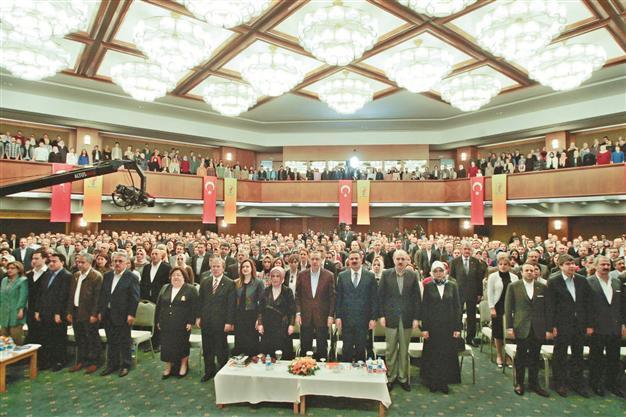Scenarios for the new Constitution
ANKARA - Hürriyet Daily News

During the AKP retreat last week , PM Erdoğan (C) held a special meeting deputies who are in the Constitution Conciliation Commission. DHA Photo
The parliamentary Constitution Conciliation Commission was able to pen the 38 articles under the chapter “Fundamental Rights and Freedoms” in one year with the “reserved” approval of the parties.Because the Peace and Democracy Party (BDP) did not submit a “legislation” proposal due to hunger strikes, the debate on the chapter could not start. Those chapters, namely legislation, judicial, financial and economic articles and miscellaneous, remain to be written before the commission. The final debate on the “preamble” of the Constitution, because four parties defend very different views, was left to the end in order to avoid a crisis. It contains “the structure of the state, the features of the republic, official language, articles not to be changed, provisions, fundamental aims and duties of the state.”
One more year
If the commission keeps this pace, then it needs at least one more year. Prime Minister Recep Tayyip Erdoğan, though, has put a deadline “by the end of this year.” Under these circumstances, what will the fate of writing the new Constitution be in 2013? The answer to this question is hidden in the lobbies of the Justice and Development Party (AKP) retreat that took place one week ago in Kızılcahamam near Ankara. Erdoğan held a very special meeting with a group including the three AKP members who are in the Constitution Conciliation Commission, Mehmet Ali Şahin, Mustafa Şentop and Ahmet İyimaya. The future of the new Constitution was debated there, and its road map was shaped.
Actually, in the retreat, the deputies generally expressed their opinion that “a new Constitution cannot be written by only four parties.” Erdoğan, too, did not take a very different stance at the meeting he held with the constitutional team. According to the information I gathered, Erdoğan openly expressed that he was not happy about the current stage and said he had “lost hope.” Nevertheless, he emphasized that the four parties had to comply with the 15-article memorandum of agreement that they have all signed, committing themselves to the deadline of “end of December 2012.”
A source whispered to me that despite Erdoğan’s giving the deadline of the end of December, he would not oppose the commission working in the first months of 2013. In that meeting, apparently, the road map of the new Constitution was made clear; however, the veterans of the AKP do not opt to share this with the public.
Three scenarios came forward after that meeting about the future of the new Constitution.
1) The AKP will wait until the beginning of 2013 and then may dissolve the commission blaming the opposition. After this, it may sit around a table for a new Constitution with another party it can reconcile with. A strong probability is with the Nationalist Movement Party (MHP) with the condition of a referendum. A weak probability is the BDP if it can convince this party on the presidential system.
2) Instead of writing a Constitution from scratch, the AKP may bring a “Constitution package” forward that would strengthen the 26 articles it had changed previously. It would discuss it with a party it can reconcile with and, also including those articles that consensus was reached on at the commission, may prepare a new package. A president affiliated with a political party and headscarves in the public domain except for the professions of judge, police officer and teacher, which are among the AKP’s priorities, may be included in the package.
3) Just like the initiative that ended in disappointment, the one to move local elections to October 2013, the new Constitution and “mini package” initiatives may also fail. The AKP would then shelve the new Constitution and mini package initiatives.
‘REVOLUTIONARY LAWS’ CHANGING?
Article 174 of the Constitution guards the so-called Revolutionary Laws. Among them are important regulations such as education, the alphab, hat and attire regulations and the abolishment of certain titles such as “effendi” and “bey,” as well as the closure of “tekkes” (dervish lodges) and “zaviyes” (small Islamic monasteries) and the introduction of civil weddings. Justice and Development Party (AKP) deputy head Hüseyin Çelik ignited a debate when he said: “No law lasts forever. Those that do not reflect the spirit of the time may change.” Will the AKP really change the revolutionary laws? Deputy Prime Minister Bekir Bozdağ has said no, due to the laws’ constitutional guarantees and the risk that that the main opposition Republican People’s Party (CHP) could appeal to the Constitutional Court for an annulment.
ALEVI INITIATIVE FROM ÇIÇEK
The Alevi dietary initiative that the ruling Justice and Development (AKP) government failed to achieve was brought about by Parliamentary Speaker Cemil Çiçek. Republican People’s Party deputy Sabahat Akkiraz sent a petition to the Office of the Parliamentary Speaker and asked for an arrangement in Parliament restaurants in accordance with the “Muharrem fast” between Nov. 15 and 27. Akkiraz’s demand was accepted by the office and Parliament officials told her that “the necessary arrangements will be made.” Alevis enter a mourning period during the month of Muharrem to commemorate one of the leading figures in their faith, İmam Hüseyin. During this period they fast for 13 days, do not drink pure water and abstain from meat.











